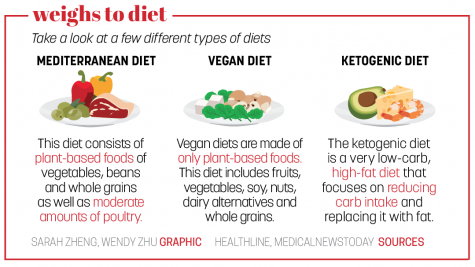Junior Melissa Su typically starts off her day by eating a breakfast with eggs. She then prepares a lunch centered around vegetables and ends the day by eating a protein-focused dinner. Su said she follows a diet in which she doesn’t eat processed foods Mondays through Fridays but eats how she wants on weekends.
Since 1950, the World Health Organization (WHO) has organized World Health Day on April 7. Every year for World Health Day, WHO strives to raise awareness around a specific area of health. Though the theme for 2020 is nurses and midwives, major topics in the past few years have revolved around ways to improve mental and physical health.
A recent study conducted by the scientific journal PLOS ONE found that limiting highly processed foods and increasing the consumption of whole grains, fruits and vegetables led to reports of improved moods and overall physical  and mental health from participants.
and mental health from participants.
Su also said she had previously tried other diets, such as ketogenic, but often found herself hungry and unmotivated. This led to her to look for a better alternative that would allow her to feel good about what she was putting in her body and eat a balanced diet. After making this dietary change about a month ago, Su said she feels more motivated to exercise regularly and maintain a balanced diet.
“I think it definitely has helped my physical health and (prevented) overeating because I am getting all my nutrients and not tricking myself. I feel like I’m eating a pretty balanced diet and I think that also makes me want to exercise more,” she said. “I have definitely felt more motivated to exercise when I became healthier in comparison to when I didn’t really care (about my diet).”
Caleb Hall, health and wellness education teacher, said one’s diet impacts virtually every aspect of their health and is a critical factor in the overall well-being of students.
“Understanding what you’re putting in your body plays a role in your mood and how you perform every day at work and school,” he said.
 Hall also said that improving one’s diet to be healthier can boost mood and energy.
Hall also said that improving one’s diet to be healthier can boost mood and energy.
“What we eat absolutely affects our mood. If we are choosing things that are nutrient-dense, things that can provide our body with energy, then we have more energy throughout the day and that helps us feel better,” he said. “If we’re eating junk, we could feel lethargic, lazy or kind of down. Breakfast is the most important meal of the day, so you should have lots of nutrient-dense things in your breakfast to provide you with energy so that you’re in a good mood all day.”
Meghan Wilson, registered dietitian for Carmel Clay Schools, said she agreed with Hall on how diet impacts many different aspects of life.
“Food plays a major role in how a person feels physically and mentally, so if you are making major changes to your food choices, it will inevitably affect other parts of your life, ” Wilson said via email.
Su said she was careful when creating a diet to suit her personal needs as she didn’t want to miss out on having essential nutrients in her diet.
“A lot of people (diet) solely for weight loss, which is a good reason, but at the same time sometimes people take it too far. And with diets like that, you could easily not get the nutrients you need. That’s also why I switched to non-processed (carbs) because that way I would still get the nutrients I needed,” she said. “But I would definitely say doing the diet for the wrong reasons can really impact your mental health and then end up making you really anxious. There’s no point in putting your body through something like that, just for the wrong reason.”
Wilson agreed with Su about diets designed for the purpose of weight loss. She said those types of diets can have both a positive and negative effect on students’ lives.
“Sometimes there is not enough education that goes into these changes and it can cause a multitude of negative effects including malnutrition, deficiency in important vitamins and minerals, unhealthy weight gain or loss (and) brain function can suffer if it is not being properly fueled,” Wilson said. “Depending on the person’s needs, weight gain or loss can be a healthy outcome as well as increased energy, short term and long term health benefits and a boost in mental health.”
Vegan and sophomore Yashaswini “Yashu” Battina said her change in diet had a positive effect on her health as it led her to stop eating certain foods.
She said, “I stopped eating a lot of sweet foods just because a lot of desserts contain animal products. So now I don’t really eat sweet stuff anymore, even if it is vegan, it’s just not my thing anymore.”
While Su said the health benefits she has gained from this diet make it overall worth it, she also said she encountered difficulties along the way.
“A struggle with (having) a Chinese family (is that) a lot of the foods in Chinese culture have a lot of rice in them,” Su said. “And since rice is a processed carb, it’s hard to eliminate that from my diet.”
 Battina said she has also reaped benefits in terms of physical health. She said she saw her quality of sleep improve after making adjustments to eat cleaner food.
Battina said she has also reaped benefits in terms of physical health. She said she saw her quality of sleep improve after making adjustments to eat cleaner food.
“I have found that I am sleeping better,” Battina said. “I am eating a lot more vegetables, which is great. For me, my diet has to be controlled to a certain extent because I am a diabetic, so I do have to have a certain level of control over what I eat, so it has been better for blood sugar.”
Speaking from personal experience, Hall said in addition to improving sleep, healthy diets can also improve the social and emotional aspect of one’s health.
“I think the better you eat, and also the more you exercise, the better sleep you can get every night,” Hall said. “It also helps with relationships. When you talk to your friends, your parents, your teachers, your colleagues, whoever, and you’re in an overall better mood, those relationships improve and can be more positive.”
According to Wilson, if students develop a balanced and sustainable diet, they may reap benefits in both mental and physical health.
“If a student is fueling their body with whole foods, getting a balanced diet in terms of macro and micronutrients and eliminating unhealthy foods and beverages, it will improve all of those factors,” Wilson said. “Focus, mental health and sleep will all improve if the body is being well taken care of on a consistent basis.”
Su said that while changing her diet was an expected change, she is extremely pleased with the result and it has helped her feel better about herself.
She said, “I would not have expected myself to ever start anything like this. It requires a lot of time, but at the end of the day I do feel healthier, and I just feel better about what I am putting into my body.”
































![What happened to theater etiquette? [opinion]](https://hilite.org/wp-content/uploads/2025/04/Entertainment-Perspective-Cover-1200x471.jpg)














































![Review: “The Immortal Soul Salvage Yard:” A criminally underrated poetry collection [MUSE]](https://hilite.org/wp-content/uploads/2025/03/71cju6TvqmL._AC_UF10001000_QL80_.jpg)
![Review: "Dog Man" is Unapologetically Chaotic [MUSE]](https://hilite.org/wp-content/uploads/2025/03/dogman-1200x700.jpg)
![Review: "Ne Zha 2": The WeChat family reunion I didn’t know I needed [MUSE]](https://hilite.org/wp-content/uploads/2025/03/unnamed-4.png)
![Review in Print: Maripaz Villar brings a delightfully unique style to the world of WEBTOON [MUSE]](https://hilite.org/wp-content/uploads/2023/12/maripazcover-1200x960.jpg)
![Review: “The Sword of Kaigen” is a masterpiece [MUSE]](https://hilite.org/wp-content/uploads/2023/11/Screenshot-2023-11-26-201051.png)
![Review: Gateron Oil Kings, great linear switches, okay price [MUSE]](https://hilite.org/wp-content/uploads/2023/11/Screenshot-2023-11-26-200553.png)
![Review: “A Haunting in Venice” is a significant improvement from other Agatha Christie adaptations [MUSE]](https://hilite.org/wp-content/uploads/2023/11/e7ee2938a6d422669771bce6d8088521.jpg)
![Review: A Thanksgiving story from elementary school, still just as interesting [MUSE]](https://hilite.org/wp-content/uploads/2023/11/Screenshot-2023-11-26-195514-987x1200.png)
![Review: "When I Fly Towards You", cute, uplifting youth drama [MUSE]](https://hilite.org/wp-content/uploads/2023/09/When-I-Fly-Towards-You-Chinese-drama.png)
![Postcards from Muse: Hawaii Travel Diary [MUSE]](https://hilite.org/wp-content/uploads/2023/09/My-project-1-1200x1200.jpg)
![Review: "Ladybug & Cat Noir: The Movie," departure from original show [MUSE]](https://hilite.org/wp-content/uploads/2023/09/Ladybug__Cat_Noir_-_The_Movie_poster.jpg)
![Review in Print: "Hidden Love" is the cute, uplifting drama everyone needs [MUSE]](https://hilite.org/wp-content/uploads/2023/09/hiddenlovecover-e1693597208225-1030x1200.png)
![Review in Print: "Heartstopper" is the heartwarming queer romance we all need [MUSE]](https://hilite.org/wp-content/uploads/2023/08/museheartstoppercover-1200x654.png)



